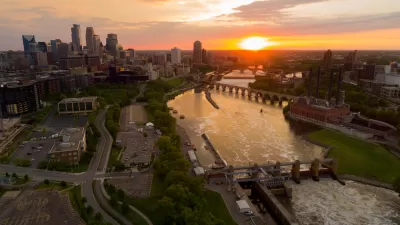After environmental groups sought to stop the city’s ambitious comprehensive plan, Minneapolis is looking for ways to resume its implementation.

After a contentious lawsuit challenging the Minneapolis 2040 Comprehensive Plan, the city has commissioned an environmental review, reports Susan Du in the Star Tribune. In the lawsuit, environmental groups argued that an environmental review of the plan should be required before its approval, while city officials maintained that the groups could challenge individual projects they deemed harmful.
“Smart Growth Minneapolis and Minnesota Citizens for the Protection of Migratory Birds claimed the 2040 Plan, designed to eliminate single-family zoning in favor of developing more housing, would pollute the air and public waters while reducing permeable land and wildlife habitat. Challenging individual projects wouldn't address the cumulative effects of the plan, the groups argued.” Meanwhile, “[Minneapolis Mayor] Frey and city staffers lobbied the Legislature this spring to change state law by exempting municipal comprehensive plans from environmental review, and were joined by city officials from St. Paul and Hopkins.”
PeggySue Imihy, president of the Minnesota chapter of the American Planning Association, supported the plan, saying “If local governments lose the ability to increase density and urban centers, the result would include further dispersed development patterns that would have far more negative environmental impacts than the full build out of any comprehensive plan.”
The implementation of Minneapolis 2040 was halted by a judge last June, but was tentatively allowed to proceed a month later.
FULL STORY: Minneapolis commissions environmental review in final stretch of 2040 Plan lawsuit

Planetizen Federal Action Tracker
A weekly monitor of how Trump’s orders and actions are impacting planners and planning in America.

Chicago’s Ghost Rails
Just beneath the surface of the modern city lie the remnants of its expansive early 20th-century streetcar system.

San Antonio and Austin are Fusing Into one Massive Megaregion
The region spanning the two central Texas cities is growing fast, posing challenges for local infrastructure and water supplies.

Since Zion's Shuttles Went Electric “The Smog is Gone”
Visitors to Zion National Park can enjoy the canyon via the nation’s first fully electric park shuttle system.

Trump Distributing DOT Safety Funds at 1/10 Rate of Biden
Funds for Safe Streets and other transportation safety and equity programs are being held up by administrative reviews and conflicts with the Trump administration’s priorities.

German Cities Subsidize Taxis for Women Amid Wave of Violence
Free or low-cost taxi rides can help women navigate cities more safely, but critics say the programs don't address the root causes of violence against women.
Urban Design for Planners 1: Software Tools
This six-course series explores essential urban design concepts using open source software and equips planners with the tools they need to participate fully in the urban design process.
Planning for Universal Design
Learn the tools for implementing Universal Design in planning regulations.
planning NEXT
Appalachian Highlands Housing Partners
Mpact (founded as Rail~Volution)
City of Camden Redevelopment Agency
City of Astoria
City of Portland
City of Laramie





























